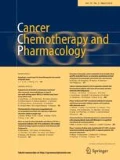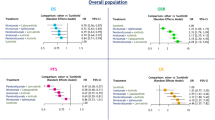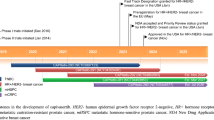Abstract
Purpose
A phase 1 study of pazopanib alone or in combination with lapatinib was conducted to assess the safety, tolerability, and pharmacokinetics of these oral tyrosine kinase inhibitors in Japanese patients with solid tumors.
Methods
In part A (monotherapy), 7 patients initially received pazopanib 800 mg/day, the recommended dose for non-Japanese patients. Then, 3 patients received pazopanib 400 mg/day on day 1 followed by 800 mg/day from day 2 onward. Three other patients received pazopanib 1,000 mg/day. In part B (combination therapy), 17 patients received pazopanib plus lapatinib (pazopanib/lapatinib) at once-daily doses of 400/1,000 mg (4 patients), 800/1,000 mg (3 patients), 400/1,500 mg (3 patients), and then 600/1,250 mg (7 patients).
Results
There was no dose-limiting toxicity during the study. In part A, most drug-related adverse events were grade 2 or lower, including neutropenia/neutrophil count decreased, thrombocytopenia/platelet count decreased, diarrhea, hypertension, aspartate aminotransferase increased, and lipase increased. In part B, rash, decreased appetite, and serum thyroid-stimulating hormone increased also occurred. In all dose groups, the plasma concentrations after multiple doses of pazopanib exceeded the target trough concentration for inhibition of vascular endothelial growth factor receptor-2 activity (20 μg/mL).
Conclusions
The pharmacokinetic profiles of pazopanib and lapatinib in Japanese patients were not apparently different from those reported in non-Japanese patients. There were no consistent trends in pharmacokinetic drug interactions between pazopanib and lapatinib. Pazopanib monotherapy at 800 and 1,000 mg once daily and pazopanib plus lapatinib once daily at any doses studied were well tolerated in Japanese patients.

Similar content being viewed by others
References
Kumar R, Crouthamel MC, Rominger DH, Gontarek RR, Tummino PJ, Levin RA, King AG (2009) Myelosuppression and kinase selectivity of multikinase angiogenesis inhibitors. Br J Cancer 101(10):1717–1723
Sternberg CN, Davis ID, Mardiak J, Szczylik C, Lee E, Wagstaff J, Barrios CH, Salman P, Gladkov OA, Kavina A, Zarba JJ, Chen M, McCann L, Pandite L, Roychowdhury DF, Hawkins RE (2010) Pazopanib in locally advanced or metastatic renal cell carcinoma: results of a randomized phase III trial. J Clin Oncol 28(6):1061–1068
Motzer RJ, Hutson TE, Cella D, Reeves J, Hawkins R, Guo J, Nathan P, Staehler M, de Souza P, Merchan JR, Boleti E, Fife K, Jin J, Jones R, Uemura H, De Giorgi U, Harmenberg U, Wang J, Sternberg CN, Deen K, McCann L, Hackshaw MD, Crescenzo R, Pandite LN, Choueiri TK (2013) Pazopanib versus sunitinib in metastatic renal-cell carcinoma. N Engl J Med 369(8):722–731. doi:10.1056/NEJMoa1303989
van der Graaf WT, Blay JY, Chawla SP, Kim DW, Bui-Nguyen B, Casali PG, Schoffski P, Aglietta M, Staddon AP, Beppu Y, Le Cesne A, Gelderblom H, Judson IR, Araki N, Ouali M, Marreaud S, Hodge R, Dewji MR, Coens C, Demetri GD, Fletcher CD, Dei Tos AP, Hohenberger P (2012) Pazopanib for metastatic soft-tissue sarcoma (PALETTE): a randomised, double-blind, placebo-controlled phase 3 trial. Lancet 379(9829):1879–1886. doi:10.1016/S0140-6736(12)60651-5
Hurwitz HI, Dowlati A, Saini S, Savage S, Suttle AB, Gibson DM, Hodge JP, Merkle EM, Pandite L (2009) Phase I trial of pazopanib in patients with advanced cancer. Clin Cancer Res 15(12):4220–4227
Kumar R, Knick VB, Rudolph SK, Johnson JH, Crosby RM, Crouthamel MC, Hopper TM, Miller CG, Harrington LE, Onori JA, Mullin RJ, Gilmer TM, Truesdale AT, Epperly AH, Boloor A, Stafford JA, Luttrell DK, Cheung M (2007) Pharmacokinetic-pharmacodynamic correlation from mouse to human with pazopanib, a multikinase angiogenesis inhibitor with potent antitumor and antiangiogenic activity. Mol Cancer Ther 6(7):2012–2021
Du Bois A, Floquet A, Kim JW, Rau J, Del Campo JM, Friedlander M, Pignata S, Fujiwara K, Vergote I, Colombo N, Mirza MR, Monk BJ, Wimberger P, Ray-Coquard I, Zang R, Diaz-Padilla I, Baumann KH, Kim JH, Harter P (2013) Randomized, double-blind, phase III trial of pazopanib versus placebo in women who have not progressed after first-line chemotherapy for advanced epithelial ovarian, fallopian tube, or primary peritoneal cancer (AEOC): Results of an international intergroup trial (AGO-OVAR16). J Clin Oncol 31(suppl):abstr LBA5503
Rusnak DW, Lackey K, Affleck K, Wood ER, Alligood KJ, Rhodes N, Keith BR, Murray DM, Knight WB, Mullin RJ, Gilmer TM (2001) The effects of the novel, reversible epidermal growth factor receptor/ErbB-2 tyrosine kinase inhibitor, GW2016, on the growth of human normal and tumor-derived cell lines in vitro and in vivo. Mol Cancer Ther 1(2):85–94
Geyer CE, Forster J, Lindquist D, Chan S, Romieu CG, Pienkowski T, Jagiello-Gruszfeld A, Crown J, Chan A, Kaufman B, Skarlos D, Campone M, Davidson N, Berger M, Oliva C, Rubin SD, Stein S, Cameron D (2006) Lapatinib plus capecitabine for HER2-positive advanced breast cancer. N Engl J Med 355(26):2733–2743. doi:10.1056/NEJMoa064320
Pennell NA, Lynch TJ Jr (2009) Combined inhibition of the VEGFR and EGFR signaling pathways in the treatment of NSCLC. Oncologist 14(4):399–411. doi:10.1634/theoncologist.2008-0276
Tabernero J (2007) The role of VEGF and EGFR inhibition: implications for combining anti-VEGF and anti-EGFR agents. Mol Cancer Res 5(3):203–220. doi:10.1158/1541-7786.MCR-06-0404
Olaussen KA, Commo F, Tailler M, Lacroix L, Vitale I, Raza SQ, Richon C, Dessen P, Lazar V, Soria JC, Kroemer G (2009) Synergistic proapoptotic effects of the two tyrosine kinase inhibitors pazopanib and lapatinib on multiple carcinoma cell lines. Oncogene 28(48):4249–4260
de Jonge MJ, Hamberg P, Verweij J, Savage S, Suttle AB, Hodge J, Arumugham T, Pandite LN, Hurwitz HI (2013) Phase I and pharmacokinetic study of pazopanib and lapatinib combination therapy in patients with advanced solid tumors. Invest New Drugs 31(3):751–759. doi:10.1007/s10637-012-9885-8
Monk BJ, Lopez LM, Zarba JJ, Oaknin A, Tarpin C, Termrungruanglert W, Alber JA, Ding J, Stutts MW, Pandite LN (2010) Phase II, open-label study of pazopanib or lapatinib monotherapy compared with pazopanib plus lapatinib combination therapy in patients with advanced and recurrent cervical cancer. J Clin Oncol 28(22):3562–3569
Johnston SR, Gomez H, Stemmer SM, Richie M, Durante M, Pandite L, Goodman V, Slamon D (2013) A randomized and open-label trial evaluating the addition of pazopanib to lapatinib as first-line therapy in patients with HER2-positive advanced breast cancer. Breast Cancer Res Treat 137(3):755–766. doi:10.1007/s10549-012-2399-4
National Cancer Institute (2006) Common terminology criteria for adverse events v3.0 http://ctep.cancer.gov/protocolDevelopment/electronic_applications/docs/ctcaev3.pdf. Accessed 12 August 2013
Therasse P, Arbuck SG, Eisenhauer EA, Wanders J, Kaplan RS, Rubinstein L, Verweij J, Van Glabbeke M, van Oosterom AT, Christian MC, Gwyther SG (2000) New guidelines to evaluate the response to treatment in solid tumors. European Organization for Research and Treatment of Cancer, National Cancer Institute of the United States, National Cancer Institute of Canada. J Natl Cancer Inst 92(3):205–216
Hutson TE, Davis ID, Machiels JP, De Souza PL, Rottey S, Hong BF, Epstein RJ, Baker KL, McCann L, Crofts T, Pandite L, Figlin RA (2010) Efficacy and safety of pazopanib in patients with metastatic renal cell carcinoma. J Clin Oncol 28(3):475–480
Bible KC, Suman VJ, Molina JR, Smallridge RC, Maples WJ, Menefee ME, Rubin J, Sideras K, Morris JC III, McIver B, Burton JK, Webster KP, Bieber C, Traynor AM, Flynn PJ, Goh BC, Tang H, Ivy SP, Erlichman C (2010) Efficacy of pazopanib in progressive, radioiodine-refractory, metastatic differentiated thyroid cancers: results of a phase 2 consortium study. Lancet Oncol 10:962–972
Acknowledgments
Appreciation is expressed to the patients and their families, as well as the many investigators who participated in the study.
Ethical standards
This study was approved by the appropriate ethics committee(s), was performed in accordance with the Declaration of Helsinki, and complied with the current laws of the country (Japan) in which it was conducted. All patients provided informed consent before inclusion in the study.
Conflict of interest
This study (VEG109693; NCT00516672) was supported by research funding from GlaxoSmithKline Pharmaceuticals. Editorial assistance was provided by ProEd Communications, Inc., Beachwood, Ohio, USA, and was supported by GlaxoSmithKline. Akiko Takekura is employee but not stockholder of GSK. Kazuo is employee and stockholder of GSK. Yasutsuna Sasaki served as a consultant/advisor for Takeda-Bio, Kowa, and GlaxoSmithKline. Yuichi Ando served as a consultant/advisor for GlaxoSmithKline. The other authors have no conflicts of interest to disclose concerning this study.
Author information
Authors and Affiliations
Corresponding author
Rights and permissions
About this article
Cite this article
Inada-Inoue, M., Ando, Y., Kawada, K. et al. Phase 1 study of pazopanib alone or combined with lapatinib in Japanese patients with solid tumors. Cancer Chemother Pharmacol 73, 673–683 (2014). https://doi.org/10.1007/s00280-014-2374-3
Received:
Accepted:
Published:
Issue Date:
DOI: https://doi.org/10.1007/s00280-014-2374-3




